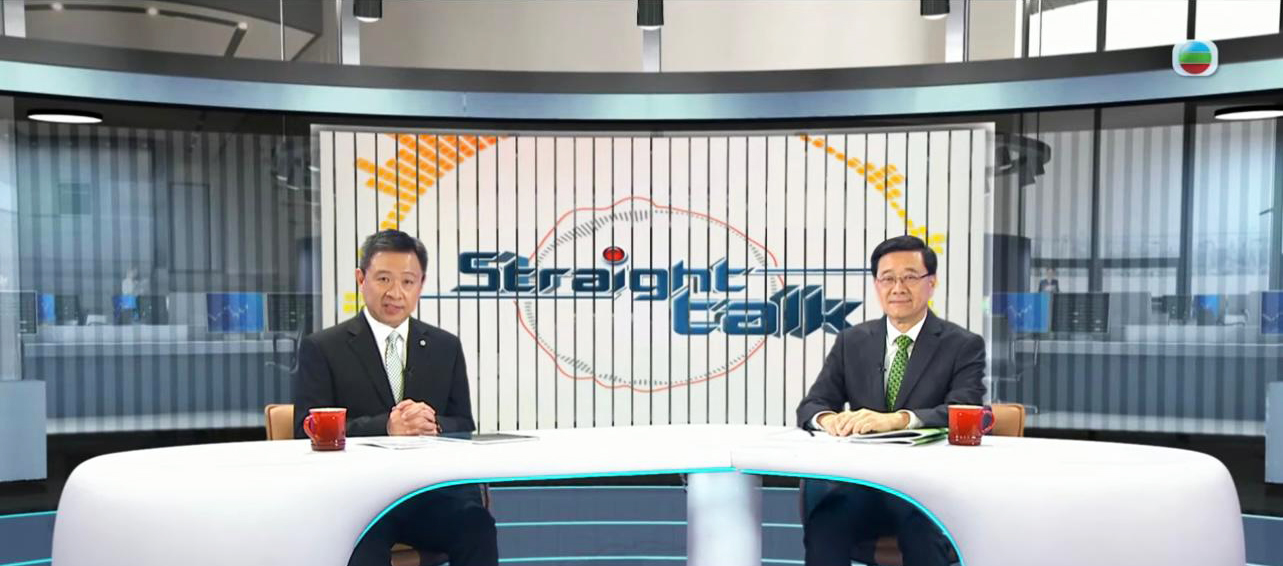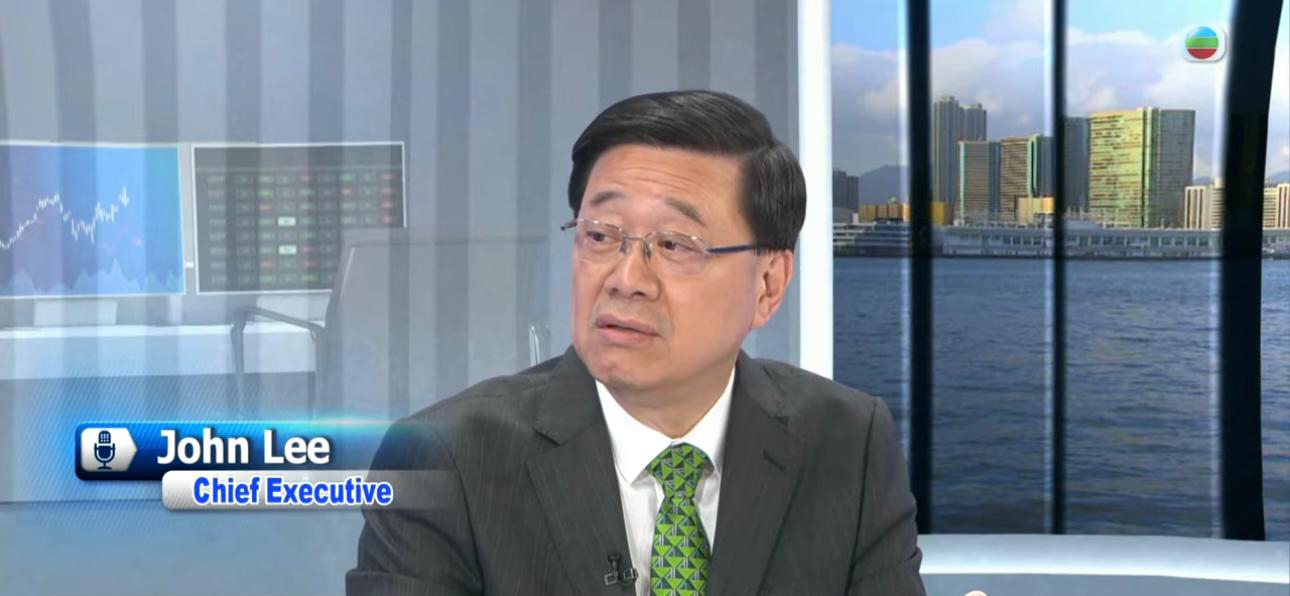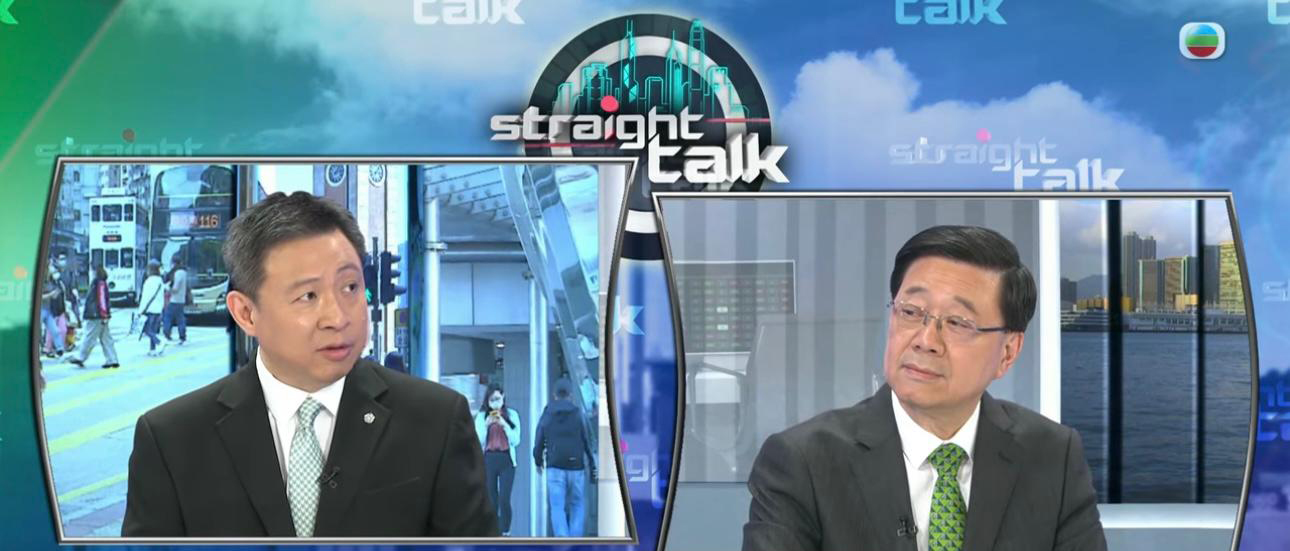
Hong Kong Chief Executive John Lee Ka-chiu is on the show this week to talk about the vision of his Policy Address, his thought process, and the rationale behind many of his initiatives.
Chan: Good evening, and welcome to Straight Talk. I'm Eugene Chan, and it is a great privilege to have our chief executive, John Lee, join us tonight to delve deeper into the new initiatives announced in his fourth Policy Address, which was delivered just last week. We will hear from Lee on building bridges to a vibrant economy, progressive development, and improved livelihoods for Hong Kong people. It is an honor to have you again, CE, and welcome again.
CE: Good evening, Eugene. Good evening, everybody.
Chan: Right, CE. So, this is your fourth Policy Address and you have entitled it “Deepening Reforms for Our People, Leveraging Our Strengths for a Brighter Future”. Before we go into it, I’d like you to talk about the tie and scarf collections that you're wearing. Can you tell the viewers what the symbols are and what the meaning behind this green color and the actual design is?
CE: Well, green color means vibrancy, it means continuity, it means sustainability. And I have been using green as the color for my Policy Address to also indicate the continuation of the policies. And a tie or a scarf for my colleagues really is to reinforce my concept of unity. Because I believe Hong Kong is a home for 7.5 million people, we have this Hong Kong identity, and we are part of it. So, building unity is … in a way, you need some identity, so that people can adhere to it.
Chan: Right.
CE: So, tie and scarf with green as the color, also, in due course, highlighting all the strengths, the good things about Hong Kong. So, this year, I'm very grateful to the design team. They have combined the three bridges of Hong Kong, which are not just the great things of Hong Kong. They also mean that Hong Kong's position is a super-connector and super-value-adder. So, a lot of good meanings in it. In my past four years, I have always believed that unity is important. So, I don't just talk about unity within government. I talk about unity within Hong Kong. Because individually, we're just a drop, but together, we are the ocean.
Chan: Right.
CE: So, the strength will be very much enhanced.
Chan: One comment that you often use, or one verse you often use, “one plus one can be more than two”. That's something you often use.
CE: Yes, yes.
Chan: Right.
Northern Metropolis
Chan: You spoke for nearly three hours last Wednesday, and one of the biggest items was accelerating the Northern Metropolis project. I want to concentrate on the accelerating part. You have given me the impression that you want things to move faster, because Hong Kong has had a lot of good things with us over the last decades, but then things are a bit slow. So, how are you going to accelerate what we need in our North Metropolis?
CE: Well, things have been moving faster since I assumed office, but I think it's not fast enough.
Chan: Right.
CE: Although we are doing things more efficiently or more effectively, I always believe there's room for improvement. There's never the best, only the better. So, in the past three years, I have clearly told myself that Northern Metropolis is the engine for us, not just for growth, for uplifting as well.
Chan: Right.
CE: The analogy I have been using is to look at Kai Tak Sports Center. Everybody who's been to it, or everybody who stepped their foot on it will almost immediately feel greater.
Chan: True.
CE: The level of Hong Kong has improved. And I think Northern Metropolis will have that effect on a much bigger scale, and also will bring us this long-term progression to much higher levels. If Kai Tak Sports Stadium can help us do that, one third of Hong Kong's geographical area can certainly do much, much greater. And that is why I think we need to focus on it. We have been moving fast. For example, when I assumed office, I changed the sixth legislation to make land production from raw land to spade-ready land, shortening 14 years to seven years for big projects. So, it can be cut in half.
Chan: Right.
CE: That's what I mean by faster. So, if I can just do it through one legislative change to shorten that time so that it will be double the speed, if I do it in every area, then the accumulated effect will be very big.
Chan: Right. CE, when we talk about big projects like that, you often work on hardware, software, and finances that could be the bottleneck. Right?
CE: Right.
Chan: Hardware, we have the land. Do we have enough people, or enough finances, to make sure this will go at the most optimal level? How would you plan for that?

CE: We do have bottlenecks. Identifying and accepting the bottlenecks is important. Recognizing it, but then, taking action to break the bottlenecks. If you can break it by 30 percent, it's increasing productivity by 30 percent. Fifty percent, is almost half, and then, even a double increase in the capacity. Well, what are the bottlenecks, right?
Chan: Right.
CE: Money is one bottleneck. Because we're talking about one-third of Hong Kong. Hong Kong is always developing, so already a lot of money is being spent on other developments. I need an extra amount of money to develop Northern Metropolis. That's one bottleneck. But tell everybody this is where I'm focusing: international money, please come; mainland money, please come. Local money, this is a much more reliable project you can count on. So, yes, you have a lot of choices.
Chan: CE, one thing I want to just barge in is a lot of people are worried about Hong Kong not having enough money, because we used to have a much larger reserve, but then, you look at the amount of debt we have, I think you said to us about 12 percent, it’s much lower than many countries. So, is this a time, for example, one third of Hong Kong, you think, it's really important to do this?
CE: It's time to actually raise more money. I think that's what you're saying. And it's worth it. Well, we have to be pragmatic, of course, right? We know that this is a bottleneck. We attract more money to come in. So, international money is coming in. For example, the trip I made to the Middle East, since the government is in close cooperation, there are a lot of public investment funds being raised, one from Saudi Arabia, another from the UAE. So, they are coming in. Money is coming in, and mainland money is also coming in. So, when businesses see opportunities, they are very wise, so they come in.
There are many factors that make Hong Kong more attractive than before. First of all, looking for diversification of risk, the whole world is looking for diversification of risk, and where is the engine of growth? So, the engine of growth is Asia, the engine of growth is China, our country, so we are part of China. So, the engine of growth is here. That's one thing. Diversification of risks, putting all your eggs in one basket, a lot of countries know that's not safe. So, they are trying to put their eggs in other baskets, and they see Hong Kong as such a safe place. It's very secure and stable. Another reason for them to come in. The third is, they know very well, I am fully focused on this: so rather than guessing what the government direction is, they know right away after reading this report, wow, the chief executive’s focus is on developing the Northern Metropolis fast. And also developing industries. They can come in because their industries can be very strong in their own country, and they think they can do a lot better here. They want new markets as well. And the third thing is, a lot of enterprises from the mainland are very strong now. They want to find new markets.
Chan: Right.
CE: They want to go through Hong Kong to find new markets, because we have the network, we have the experience, our professional services are very strong, they need this. The enterprises themselves may be very strong, but they need support. They also need guidance so that they don't have to make mistakes. So, Hong Kong is the best place for them.
Chan: So, how are Hong Kong people going to benefit from all this?
CE: Well, at the macro-level, I think Hong Kong people will definitely benefit, because when the cake grows bigger, everybody will benefit. We estimate that we will have 2-3 percent growth. We're quite confident in that despite the geopolitical risk and uncertainty. But, so far, I think we're moving in the right track. And a lot of risks have been stabilizing, but property markets have stabilized, in particular, residential property markets. So, macro-level, we will benefit. And in fact, international assessment has already endorsed that.
Chan: Okay.
CE: Our positions in different aspects have risen; we’re the number three financial center. We move one position for us upward. Hong Kong, as a whole, in terms of competitiveness, we've also moved up to become number three again. Regarding talent competitiveness, we've moved up 12 positions in two years to begin number four. So, internationally, at the macro level, we are doing quite well. But micro, how do all these things eventually realize at the local level? Of course, we need to work hard on that. And this is something that I'm doing in the Policy Address, particularly, I'm telling people I'm doing all these to improve people's livelihoods.
Chan: Right, CE. Let's go for a short break now. We will be back with more Straight Talk.

Partnership with Mainland enterprises
Chan: Welcome back. We have our chief executive, John Lee, talking to us about the rationale of his 2025 Policy Address. So, CE, thank you very much for telling us you are determined to accelerate the Northern Metropolis development, which is going to be a big engine for Hong Kong, both macro and micro. One comment that you mentioned is that a lot of money wants to come to Hong Kong, and they want to diversify their risks, and a lot of mainland companies want to go outside and look for new markets. So, I saw that in your Policy Address, you were saying that you support mainland enterprises in going global. Can you explain to the viewers what we can do? And who are we going to work with? And how is Hong Kong going to benefit? Because if you are just helping them, Hong Kong may not benefit. So, what is your rationale behind these?
CE: Well, some of the paragraphs explain the advantages that Hong Kong will gain in the process of helping enterprises to go global. In my Council of Advisors, and also the experts who advise me in the CE Policy Unit, a lot of them said that when I talk about capitalizing on the strength of Hong Kong, we look at what the strengths are and what the new opportunities are. Then I will say that Hong Kong has a great advantage of being a bridge between the mainland market and the international market. And it has always been more about attracting companies and money to come in. But they say the new opportunities should be about going out.
Chan: Right.
CE: One reason is that Chinese enterprises have been very competitive now. They need new markets, and they also don't want to rely solely on one market, one country. So, they want new markets and they want to go through Hong Kong because of the added value we can give them, which means financing, supply chain management, professional services, and network experiences. And my last visit to the Middle East, when I took together with me over 25 enterprises from the mainland, the result we got was overwhelmingly successful.
Chan: Right.
CE: A lot of contracts signed, actual projects agreed, and then have gone ahead. So, the beauty of Hong Kong is now in the full eye of many enterprises. They see the beauty of Hong Kong, and they see how one plus one can be greater than two. In due course, they will set up their, say, treasury center in Hong Kong, and they will use our professional services. And I am trying to attract more banks to set up a sub-office here, so that when the headquarters is in Hong Kong, they can be more focused on the international market.
Chan: I see.
CE: So, when enterprises go from Hong Kong to the world globally, we will do a lot more business. Supply chain management, which we have always been good at. Professionals, such as you, get a lot of jobs. And also, our network will also expand. We will become more welcomed because the players in this platform are strong players. One occasion when I went with the mainland enterprises, the project value they talked about to a lot of countries which we visited, was eye-wobbling because it is such a big sum and a big investment that all these mainland enterprises can offer. And so we will, through this, do a lot of business as well. And Hong Kong has always been a center for different things. In the policy report, in the Policy Address, I have mentioned capitalizing on the center positions of Hong Kong. Different centers – financial center, shipping center, trade center, I&T center, and supply chain center. That is very important. So, it is not just helping enterprises, it is both helping and helping ourselves because we gain as much as they gain. And the cake will just grow ...
Chan: Right.
CE: … grow, I think, by many folds so that everybody benefits.
Chan: Right.
CE: And Hong Kong's value, Hong Kong's beauty will be seen by more people. So, that reinforcing effect will be very strong.
HoD Accountability System
Chan: Right. CE, since you just mentioned that Hong Kong is much more united today, one of the new initiatives that you have set up is the establishment of the heads of department accountability system, which they say they will penalize underperforming senior civil servants, and hopefully address their internal deficiencies. We all know that Hong Kong is being very proud. We are ranked number 2 in public service in the world. And we have very high integrity as well. Is this the right time now to give them even a push to go better? Or what is your rationale behind it? And why now?
CE: Well, it is a positive system; it is not a negative system. It is a positive system for even greater improvement. We are number 2 already internationally in regard to government efficiency. And that cannot be achieved without the efficiency of the civil servants. They are already very good. But then I do this, I actually have laid out three purposes. A lot of people overlook the second purpose, which is a positive promotion.
Chan: Right.

CE: So, not just sticks or punishment, but also have rewards. The other most important element is to create public confidence in the government because the department head being accountable for the department's right or wrong has always existed. But the public, it seems, is not aware of it first of all, and they don't seem to have strong faith in this system. And this is because, despite that, we have always held the department head accountable for the performance of the department as a whole; we haven't systematized it, we haven't institutionalized it. So, the public doesn't know. And now I have clearly laid out in the Policy Address a framework, which talks about how it will be activated, the mechanism, who will then do the investigation, and how the accountability will end. So, we will deal with them, where there are mistakes administratively or disciplinary, accordingly to the severity. So, the system is to increase the public confidence that the government will always look for continuous improvement. So, that is purpose number 2. Because I want them to be very fit, the department head will now ensure that he will keep fit, the whole government will keep fit, systems are up and running efficiently and effectively, and there is a good organizational culture for it. And he will be an active leader, not a passive leader. That is the purpose of the accountability system. And why now? Because I want to increase the public's confidence in the government even more. Even though we are already number 2 in the world, the public doesn't look at all these international assessments, understandably. But I want to tell them I have a system which, first of all, demands departments to look for continuous improvement; at the same time, when they do have problems, it will be looked at, it will be investigated, and we will deal with it according to the severity of the matter.
Supporting media to go regional and international
Chan: Right. CE, I mean, it is very good that you can clearly explain to the viewers your thought processes and the rationale behind all the Policy Addresses. And one area that I am really being encouraged is you will be looking at supporting the media to go regional or even more international, because since I have been embarking on this show for the last 4 years, even 5 years, I have been hearing people telling me “Wow, I didn't know Hong Kong has such good people in different areas.” Because if you look at some of the friends from overseas, they say that by reading the newspaper or watching television, they often get an obscured view of Hong Kong, sometimes intentionally, sometimes being misinformed. How are you going to make sure the good Hong Kong stories will go out to the world and let people know how good Hong Kong is?
CE: First of all, I have this idea because it was one of the suggestions in my consultation. And I looked at it seriously. Hong Kong is a family for 7.5 million people, for all industries. So, if I can help, I should help.
Chan: Yes.
CE: And the Hong Kong market is very challenging; it is very tight. If we can make it a bigger cake for everybody, we will go out, create new markets, and it will help you. And also, I believe the Hong Kong media organization is doing very well. Hong Kong media are not just local media. We are very international because we are always international in our outlook, in our vision, in our day-to-day doing of things. Since we are so good, it is a matter of whether I can open the door for you, so that you can show other people how good you are. You can make use of your own network or develop a new network. I have described this like this, I am like “the pilot of an airplane”, and I drive you there, I take you there, and then I also go to open doors, government-to-government doors, then you are on board, and then you do your things. I have full faith that you can do your job very proficiently, very well. But of course, I will be talking to media representatives to see what they basically think they want.
Chan: Right.
CE: Because I believe strongly that supply has to meet demand. And it will produce the best result if I am very clear about, say, the first 5 things that will mean most to the media organizations, rather than second-guessing what they are.
Chan: Okay.
CE: So that will help, I think. It is an offer.
Chan: Thank you very much. And thank you once again for sharing your insights on this Policy Address. So, it is clear that Lee's address aims to connect Hong Kong's strength, our people, our location, and our institutions, to a brighter and more dynamic future as Hong Kong continues to bridge opportunities regionally and internationally.
Thank you for joining us on Straight Talk, and have a good evening.


